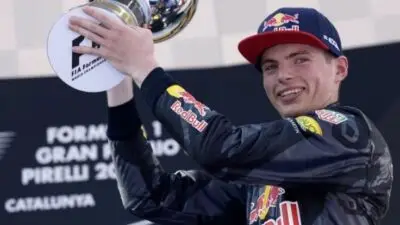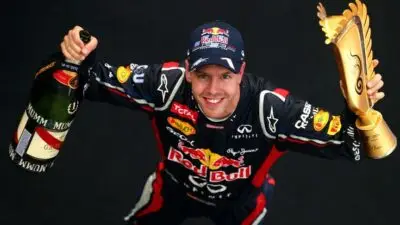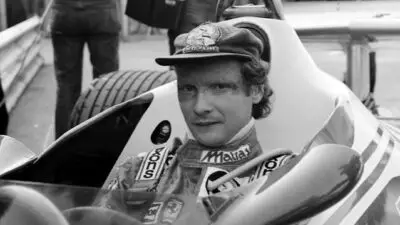Marc Márquez has established himself as one of MotoGP’s greatest talents, reaching remarkable milestones throughout his career. At the recent Dutch Grand Prix, he equalled Giacomo Agostini’s 68 premier class wins, bringing his total to 94 victories across all categories. His 2025 season has been particularly impressive, showcasing a dominance that has him on track for a potential ninth world championship title.

The Spanish rider’s journey through the sport has been nothing short of extraordinary. From making an immediate impact upon joining the MotoGP grid in 2013 to his current form described as the most extraordinary and reliable version of himself yet, Márquez continues to rewrite the history books. His recent performance at Assen demonstrated his masterful skill, delivering a clinical display at the Cathedral of Speed that further cemented his legendary status.
Key Takeaways
- Marc Márquez has equalled Agostini’s record with 68 premier class wins and amassed 94 total victories across all motorcycle racing categories.
- His 2025 season shows a return to his dominant pre-injury form, positioning him as the championship favorite.
- Márquez’s racing style and adaptability have redefined standards in MotoGP, earning him respect as one of the sport’s all-time greats.
Marc Márquez: The Rise of a MotoGP Phenom

Marc Márquez ascended from a young motorcycle enthusiast to one of the most dominant forces in racing history through natural talent, determination, and fearless riding style.
Early Life and Racing Beginnings
Born on February 17, 1993, in Cervera, Spain, Marc Márquez developed a passion for motorcycles at an extraordinarily young age. He began racing at just six years old, first competing in motocross before transitioning to minimoto competitions.
His natural talent was evident from the beginning. Young Marc quickly outperformed competitors, displaying the fearless riding style that would later become his trademark in professional racing.
By age 15, Márquez made his World Championship debut in the 125cc class in 2008. This marked the beginning of what would become one of the most remarkable careers in motorcycle racing history.
His early racing years revealed not just speed but adaptability and race intelligence rarely seen in riders so young. These foundational years shaped his aggressive riding technique and mental resilience that would serve him well throughout his career.
125cc and Moto2 Triumphs
Márquez’s ascent through the racing ranks accelerated quickly. After learning valuable lessons in his first full season, he claimed the 125cc World Championship in 2010 at just 17 years old, showcasing exceptional skill and maturity beyond his years.
His move to Moto2 in 2011 brought new challenges. Despite suffering a serious vision problem from a crash that threatened his career, he returned to win the 2012 Moto2 World Championship in dominant fashion.
Key Moto2 stats:
- 16 race wins
- 25 podium finishes
- 14 pole positions
His Moto2 performance demonstrated not only raw speed but impressive race craft and mental toughness. Márquez developed a reputation for remarkable comebacks and overtaking maneuvers that seemed impossible to other riders.
Transition to MotoGP
In 2013, Márquez joined Repsol Honda Team in MotoGP, making an immediate impact that shocked the racing world. He became the youngest ever MotoGP race winner in his rookie season.
The culmination of his remarkable debut year came when he secured the 2013 MotoGP World Championship, becoming the youngest champion in premier class history at just 20 years old. He broke numerous records that season:
- Youngest pole position holder
- Youngest race winner
- First rookie to win the championship since 1978
Márquez’s transition to MotoGP revealed his extraordinary adaptability to the powerful 1000cc machines. His unique riding style—leaning off the bike at extreme angles and saving near-crashes with his elbow—revolutionized racing techniques in the premier class.
By the end of his debut MotoGP season, it was clear that a racing phenomenon had arrived who would redefine what was possible on a motorcycle.
MotoGP Dominance and Record-Breaking Achievements

Marc Márquez has established himself as one of the greatest MotoGP riders in history through his exceptional skill and remarkable achievements. His career is defined by record-breaking performances and an unmatched competitive spirit that has reshaped the sport’s landscape.
Championship Titles and Milestones
Marc Márquez has captured six MotoGP World Championship titles, cementing his place among the legends of the sport. His championship journey began with a historic rookie season in 2013, when he became the youngest ever MotoGP world champion.
The 2014 season demonstrated Márquez’s complete dominance as he won an incredible 13 out of 18 races, breaking Mick Doohan’s previous record of 12 wins in a single season. This achievement showcased not just his raw speed but his ability to excel across different tracks and conditions.
His career statistics are staggering. Márquez has amassed 94 victories across all categories, with 68 of those coming in the premier class, matching the legendary Giacomo Agostini’s record.
Notable Victories and Historic Moments
Márquez’s racing style is characterized by aggressive overtaking, incredible saves, and pushing beyond conventional limits. In recent competitions, he became the first rider to win three sprint and three full-length races consecutively, establishing yet another unprecedented record in MotoGP.
His performance at the Grand Premio de Argentina stands out as particularly impressive. Márquez not only won the race but also set a new lap record (1m38.243s), finishing 24.5 seconds faster than the previous race duration record – an improvement of nearly one second per lap.
In 2013, he claimed victory in Austin at just 20 years and 63 days old, breaking a record held by Freddie Spencer for over three decades. This early success foreshadowed the remarkable career that would follow.
Rivalries and Competitive Landscape
Throughout his MotoGP career, Márquez has faced formidable competitors who have pushed him to his limits. His battles with current champion Pecco Bagnaia have become one of the most exciting rivalries in recent years, especially since Márquez joined Ducati.
Before switching to Ducati in 2024, Márquez spent his entire MotoGP career with Honda’s factory team since his debut in 2013. This transition has added a new dimension to the competitive landscape of MotoGP, with fans eager to see how he performs on different machinery.
His racing approach often contrasts with others on the grid – while some competitors favor calculated precision, Márquez is known for his aggressive, all-or-nothing style that has both thrilled fans and occasionally led to controversies with fellow riders.
Teams, Machinery, and Key Partnerships

Marc Márquez’s career has been defined by his relationships with manufacturers and the technical staff who support his extraordinary talent. His journey spans significant partnerships with both Honda and Ducati, each presenting unique challenges and opportunities.
Honda Era: The RC213V Machine
Márquez established himself as a dominant force during his time with Repsol Honda Team. In 2020, he signed a four-year contract that was supposed to keep him with the Japanese manufacturer until 2024. This partnership yielded six premier-class championships, making him one of MotoGP’s most successful riders.
The RC213V motorcycle became synonymous with Márquez’s aggressive riding style. He developed a unique ability to control the Honda’s notoriously difficult handling characteristics, often riding beyond what many considered the bike’s limits.
Despite his success, Honda’s technical challenges in later years created friction. The motorcycle’s development stalled while competitors advanced, leading to a difficult period where Márquez’s talent couldn’t overcome the machine’s limitations.
Switch to Ducati and New Challenges
Márquez made a career-defining move when he left Honda to join the Gresini Racing team in 2024, riding a year-old Ducati. This transition marked his first time competing on non-Honda machinery in the premier class.
His adaptation to the Ducati was remarkably swift. Márquez won three races on the GP23 and emerged as a title contender alongside Francesco Bagnaia and Jorge Martin.
For 2025, Márquez achieved his goal of securing a factory ride, joining the official Ducati Team alongside Bagnaia. This partnership creates one of the most formidable rider lineups in MotoGP history, with two multi-time world champions sharing the same garage.
Influential Team Members and Engineers
Behind Márquez’s success stands a dedicated technical team. During his Honda years, he built a cohesive unit that understood his unique riding style and feedback.
At Ducati, he’s formed new working relationships with key figures including team manager Davide Tardozzi, who manages the delicate balance between two championship-caliber riders.
The relationship between Márquez and his crew chief has always been crucial to his performance. These engineers translate his feedback into motorcycle setup changes that maximize his exceptional riding talent.
Márquez’s ability to communicate precisely what he needs from the motorcycle has made him valuable to manufacturers beyond just his riding skill, contributing to overall bike development.
Adversity, Injury, and Remarkable Comebacks

Marc Márquez’s career has been defined not just by his victories but by his extraordinary resilience in the face of potentially career-ending injuries. His journey through physical pain and mental challenges has become an inspirational story in motorsport.
Setbacks and Recovery Journey
Márquez’s darkest period began at the 2020 Spanish Grand Prix in Jerez. While executing a remarkable comeback ride after an early mishap, he suffered a devastating crash that resulted in a broken right humerus. What followed was a nightmare of complications:
- Multiple surgeries on his right arm
- Diploplia (double vision) issues
- Nearly three years of constant physical therapy
- Extended absences from racing
The pain was so severe that Márquez later described it as “unbearable”, admitting it even altered his character. During his recovery, he found inspiration in fellow Spanish athlete Rafael Nadal, whose own comeback from injuries resonated with the MotoGP champion.
Returning Stronger: The Modern Márquez
By 2025, Márquez has transformed from a “shadow of his former self” into a dominant force once again. His switch to Ducati has proven pivotal, allowing him to adapt his aggressive riding style to a more manageable approach.
The eight-time world champion now views victory differently. “Winning became a gift after my accident,” he reflected in a recent interview. His resilience continues to be tested, as seen at recent events where he:
- Raced through hand circulation issues after a 200kph crash
- Required stitches in his chin yet continued competing
- Overcame his “most difficult weekend” to secure podium finishes
Márquez’s comeback story has transcended MotoGP, placing him alongside sporting legends who refused to let injury define their careers.
Racing Style and Impact on MotoGP

Marc Márquez revolutionized MotoGP with his distinctive racing approach that combines fearless risk-taking with technical brilliance. His influence extends beyond personal achievements to reshape how modern riders approach the sport.
Aggressive Riding and Technical Mastery
Márquez’s style is defined by his trademark “elbow to the ground” technique that redefined riding standards in MotoGP. His aggressive approach includes impossibly late braking and extreme lean angles that push the physical limits of motorcycle racing.
When Márquez entered MotoGP in 2013, he showed no fear of established champions. His willingness to take risks evolved from what many called a “Rambo” style to a more universally respected approach.
Former MotoGP rider Cal Crutchlow has highlighted Márquez’s ability to adapt his riding to different conditions and challenges as key to his success. This adaptability has allowed him to remain competitive through various rule changes and motorcycle developments.
Innovations and Influence on the Sport
Márquez has inspired a new generation of riders who have adopted and adapted his techniques. His revolutionary racing style introduced innovations in body positioning and corner entry that are now standard approaches in MotoGP.
The Spanish champion’s approach to racing has evolved significantly over his career. Recently, he credited two Ducati rivals for influencing changes in his riding style for the 2025 season.
His impact extends to safety equipment and track design, as his extreme riding style pushed manufacturers to develop better protective gear and prompted circuits to reconsider safety features.
The 2025 season has showcased what some call “the most extraordinary version” of Márquez, demonstrating his continued ability to refine and enhance his racing approach even after multiple championships.
Media Presence and Legacy

Marc Márquez transcends the traditional boundaries of motorcycle racing through his immense media influence and lasting impact on the sport. His unique riding style and charismatic personality have created a global following that extends far beyond MotoGP’s core audience.
Media Coverage and Global Recognition
Marc Márquez has become a media phenomenon that reaches audiences worldwide. According to recent studies, Márquez has taken over from previous stars in terms of social media popularity in MotoGP. His influence extends beyond racing circles, making him one of the few riders who truly transcends the paddock.
The Spanish champion’s signing with Ducati significantly elevated the manufacturer’s global visibility. In today’s digital age, having a figure like Márquez allows brands to reach audiences that traditional marketing cannot access.
His appeal has attracted premium partnerships, including reported interest from luxury brands. This crossover appeal has made Márquez a valuable ambassador not just for racing teams but for global corporations seeking authentic connections with audiences.
Shaping the Future of Motorcycle Racing
Márquez’s influence extends to the structural changes in MotoGP itself. With Liberty Media’s acquisition of the sport, Márquez has positioned himself as a thoughtful voice for evolution while preserving the sport’s core identity.
His journey is being documented for future generations, with Netflix producing a documentary about his remarkable career. This mainstream media coverage helps introduce new audiences to motorcycle racing.
Márquez’s willingness to take risks—both on the track and in career moves—has inspired younger riders. His recent comments about having lost financial opportunities to pursue competitive success demonstrate his prioritization of sporting achievement over commercial gain.



